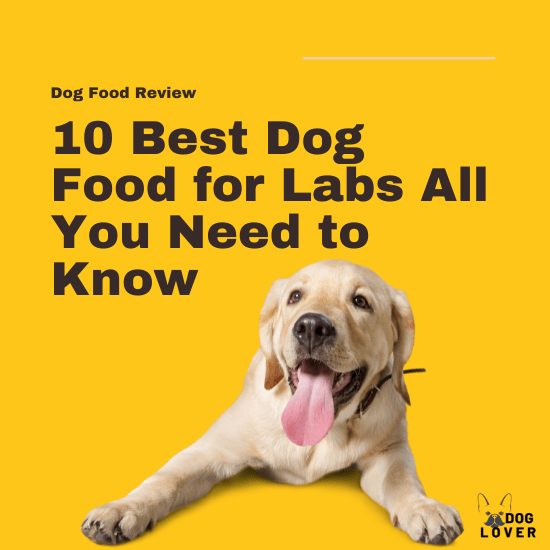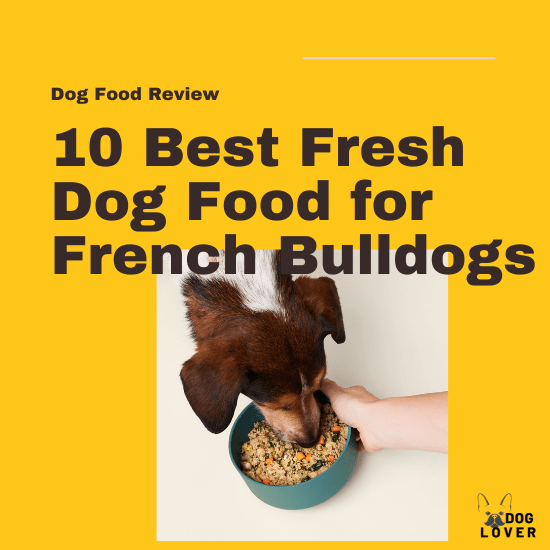Best Dog Foods for Atopic Dermatitis
Atopic dermatitis is an inherited condition causing hypersensitivity to environmental triggers like pollens, molds, and mites, as well as food-related allergens, such as animal proteins or grains.
It is characterized by immune system alterations and skin barrier defects. In dogs, lesions suggest allergens are absorbed through the skin due to this defective barrier, similar to atopic dermatitis in humans.
While environmental allergens fit this theory, the connection between food allergies and skin disease is less clear. However, food-related skin allergies are now considered part of atopic dermatitis in both dogs and humans.
How do we know our dog’s itchy skin is an allergy?
Not every itch indicates an allergy, but certain signs point to food allergies in dogs. Food allergies typically cause nonseasonal itching and inflammation.
If the skin issues are seasonal, a food allergy is unlikely. Other indicators include mild or intermittent gastrointestinal symptoms such as occasional vomiting, loose stools, excessive flatulence, or burping.
Dogs with food allergies may have more than four bowel movements a day. These clues help differentiate food allergies from other causes of itching or discomfort in dogs, guiding appropriate treatment and dietary adjustments.
Diagnosis of food allergies requires an elimination diet
To choose the right diet for your dog, it’s important to consider what it has been eating, including meals and treats.
Ideally, a dog’s diet should include novel proteins and carbohydrates—foods they haven’t consumed before—to minimize the risk of triggering allergies.
Novel protein sources such as rabbit, kangaroo, bison, and crocodile, once found only in prescription diets, are now available in many over-the-counter options.
Veterinarians often recommend hydrolyzed prescription diets like Hill’s ZD® (chicken), Royal Canin’s Ultamino® (poultry byproducts), Purina’s HA® (soy), or Royal Canin’s vegetarian diet, particularly for dogs sensitive to animal proteins.
However, these diets may include controversial ingredients and provide limited nutritional value.
The only proven way to diagnose food allergies is through diet trials and challenges, as most food allergies are triggered by animal proteins rather than grains.
While avoiding allergens is essential, ensuring your dog receives the necessary nutrients based on its life stage is equally important.
- Puppies require at least 23% protein and 8% fat to support their growth and development.
- Adult dogs need 18% protein and 6% fat, with adequate protein for lean muscle and moderate fat for energy.
- Senior dogs benefit from a high-quality, digestible diet, avoiding high-calorie foods as their activity levels decline.
Selecting the best diet for your dog takes careful research. Experts often recommend offering variety to ensure a balanced, nutritious diet, and we are here to guide you through the options to support your dog’s overall health.
What Are the Six Essential Nutrients?
Even if your dog suffers from atopic dermatitis or another skin allergy, it still requires six essential nutrients crucial for a balanced diet.
Many dog foods labeled “Complete and Balanced” meet the AAFCO nutrient standards, meaning they provide all the nutrients your dog needs. These six nutrients are:
- Water: Making up 70-80% of a dog’s body weight, water is vital for digestion, nutrient transport, and temperature regulation. Dogs need about one ounce of water per pound of body weight daily.
- Proteins: Dogs need 23 amino acids, 10 of which must come from food. Look for dog foods with high-quality proteins like whole meats (fish, poultry) and meat meals (chicken, salmon) as the first ingredient. Meat meals provide four times the protein of whole meats.
- Fats: Essential for energy and skin health, fats like linoleic acid, omega-6, and omega-3 fatty acids must be included in the diet, as the body cannot produce them.
- Carbohydrates: Necessary for energy and digestion, carbs come from plant-based sources like grains, barley, and potatoes, providing sugars, starches, and fiber.
- Vitamins: Vitamins support growth and overall health. Key vitamins include Vitamin D (calcium regulation), Vitamin A (immune boost), Vitamin E and C (antioxidants), Vitamin K (blood clotting), and Vitamin B12 (nervous system health).
- Minerals: Minerals like calcium, phosphorus, iron, zinc, and selenium support bone formation, oxygen flow, wound healing, and nerve function.
What to look for on your dog food labels
Like human food labels, your dog’s food label lists ingredients from highest to lowest by weight, with the first five making up 80% of the food. Studying the ingredients helps you understand what you’re feeding your dog.
The Guaranteed Analysis (GA), found on the back of the bag or can, provides the nutrient profile, showing the minimum levels of crude protein and fat, as well as the maximum crude fiber.
This helps you know the exact nutritional composition of the food, ensuring you’re giving your dog the proper balance of essential nutrients.
The name game when decoding the label
The first five to ten ingredients on a dog food label reveal the quality of the food, with protein ideally listed first.
For “Beef Dog Food,” beef must make up 95% of the product, according to FDA guidelines. If the label reads “Beef Dinner,” “Beef Recipe,” or “Beef Flavor,” the beef content only needs to be 25% or more.
For example, if the ingredients list shows beef first, followed by whole-grain corn and soybean meal, the beef content is higher than both of those, indicating beef is the primary ingredient.
What Are Fillers?
Many dog foods, especially kibble, contain fillers—bulky, starchy, and low-nutritional ingredients used to keep costs down.
These fillers, such as corn, wheat, rice, by-products, and pea or potato protein, may cause allergies or sensitivities in some dogs. Opinions on whether these are unhealthy vary among dog owners.
Best Dog Food For Atopic Dermatitis
- Best Overall Wet Dog Food: Zignature Lamb LID Formula Grain-Free Canned Dog Food $38.28 per case of 12 x 13-oz ($3.19-can)
- Best Overall Dry Dog Food: Taste of the Wild Ancient Prairie Dry Dog Food $54.99 per 28-lb bag ($1.96)
- Best Limited Ingredient Kibble: Acana Singles Limited Ingredients Dry Dog Food $89.99 per 25-lb bag ($3.60-lb)
- Best Grain-Free Kibble: Canidae PURE Grain Free, Limited Ingredient Dry Dog Food Salmon, and Sweet Potato $74.99 per 24-lb bag ($3.12-lb)
- Best Price-Effective: Rachael Ray Nutrish Just 6 Limited Ingredient Diet Dry Dog Food $39.98 per 28-lb bag ($1.43-lb)
Zignature Lamb LID Formula Grain-Free Canned Dog Food
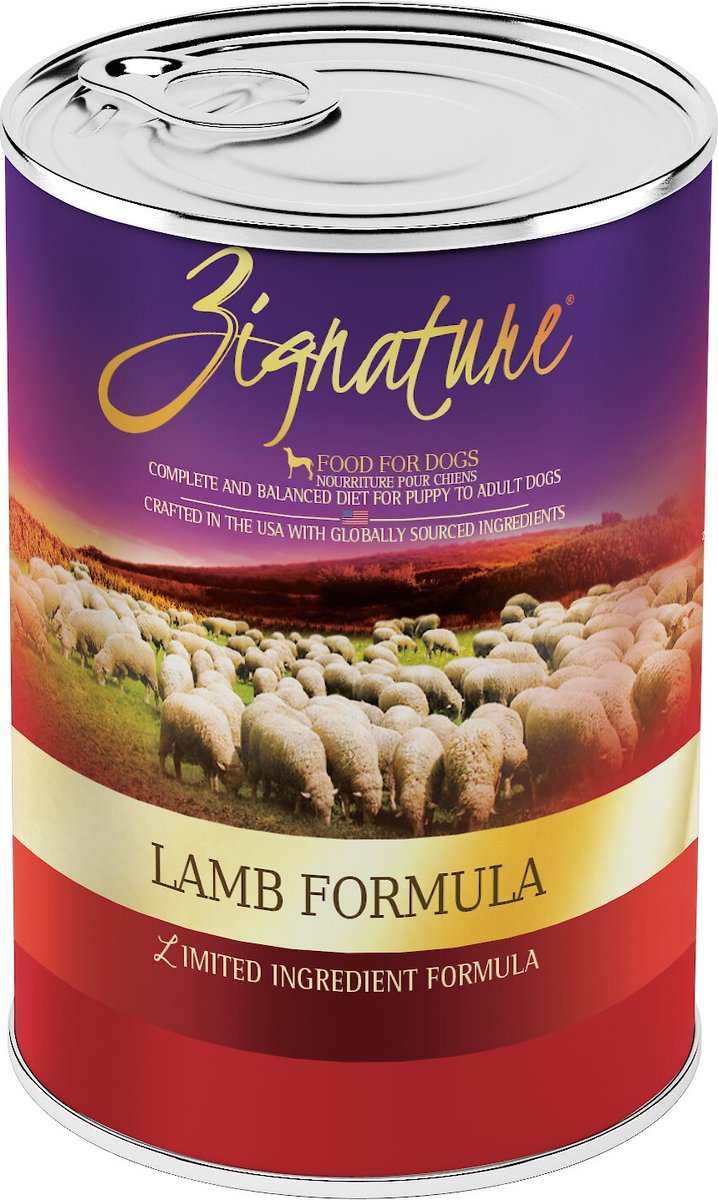
Zignature Lamb Limited Ingredient Formula Grain-Free Canned Dog Food, launched in 2012 by Pets Global, Inc, offers high-quality nutrition with farm-raised lamb, peas, chickpeas, and carrots.
Free from common allergens, it provides well-balanced protein, fat, and carbs.
Ideal for dogs with skin conditions, it’s our top choice for wet dog food.
- First 5 Ingredients: Lamb, Lamb Broth, Lamb Liver, Peas, Chickpeas
- Guaranteed Analysis: Crude Protein 9.5% min, Crude Fat 5.5% min, Crude Fiber 1.2% Max
- Calories: 417 kcal per 8-oz cup
- Suitable for which dogs: Breeds of all sizes, from Shih Tzus to German Shepherds, both breeds prone to develop atopic dermatitis.
- Feeding: one 8-oz cup of food for every 25 pounds of its body weight
- Key Benefits: Lamb, lamb broth, lamb liver, and lamb meal are all ingredients that indicate the animal source. There are no unidentified ingredients that could mislead dog owners about precisely what they feed their precious canine companions. There are also no added oils in this dog food, so the fats come from animal and plant ingredients.
- Price: $38.28 per case of 12 x 13-oz ($3.19-can)
Taste of the Wild Ancient Prairie Dry Dog Food
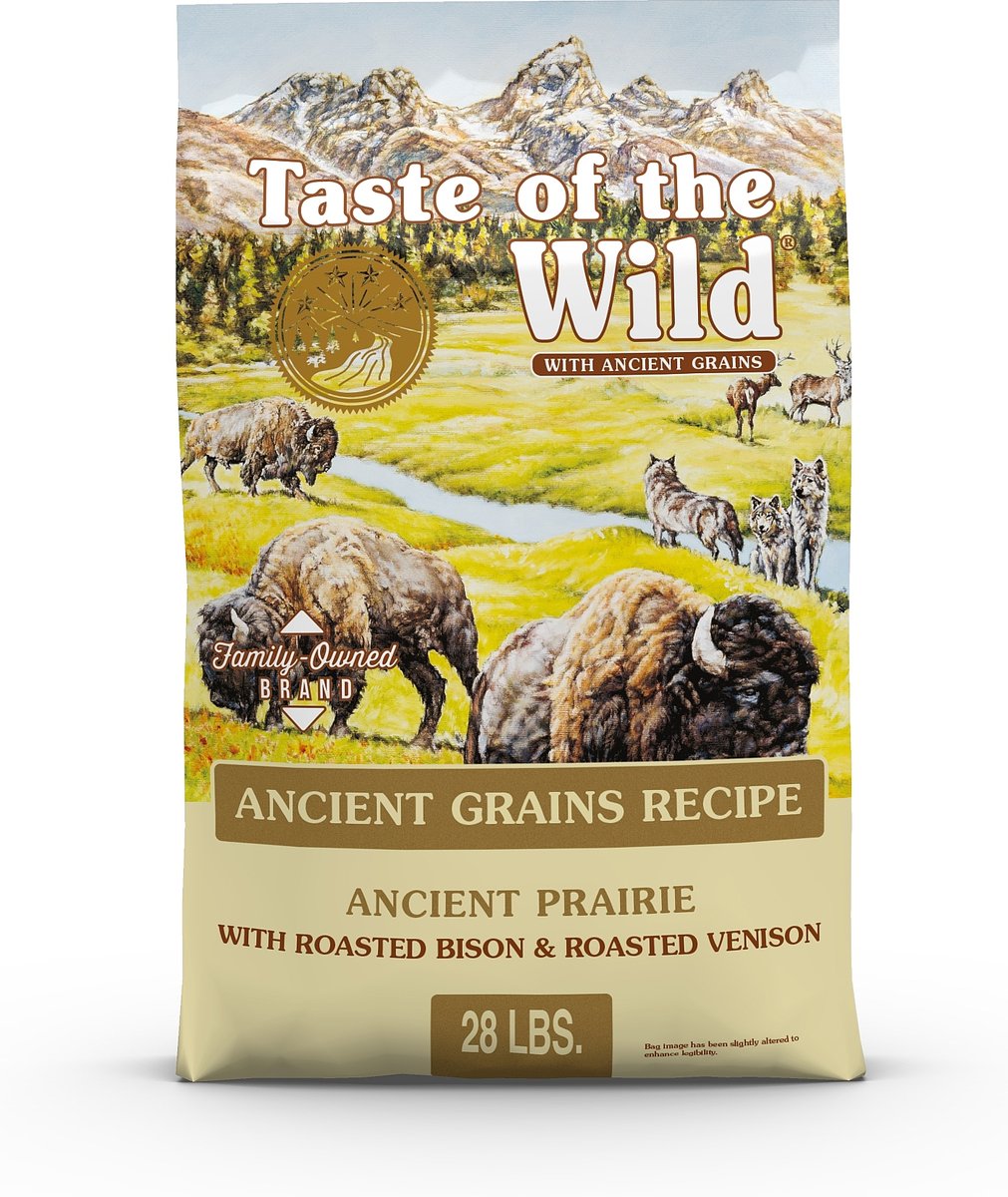
Taste of the Wild Ancient Prairie Dry Dog Food by Diamond Pet Foods is ideal for active breeds like Weimaraners, Labs, and Westies.
It features novel proteins (water buffalo, pork, bison, venison), ancient grains, and DHA-rich salmon oil.
Free from artificial additives, it’s a balanced, high-quality, low-priced option.
Recommended for dogs with atopic dermatitis.
- First 5 Ingredients: Water Buffalo, Pork, Chicken Meal, Grain Sorghum, Millet
- Guaranteed Analysis: Crude Protein 32% min, Crude Fat 18% min, Crude Fiber 3% Max
- Calories: 445 kcal per 12.7-oz can
- Suitable for which dogs: All breeds and life stages of highly active dogs prone to food allergies.
- Feeding: one 12.7-oz can for every 10 pounds of the puppy’s body weight.
- Key Benefit: The novel Buffalo, Bison and Venison proteins offers dogs typically sensitive to chicken, beef, and lamb the protein they need to thrive,
- Price: $54.99 per 28-lb bag ($1.96)
Acana Singles Limited Ingredients Dry Dog Food
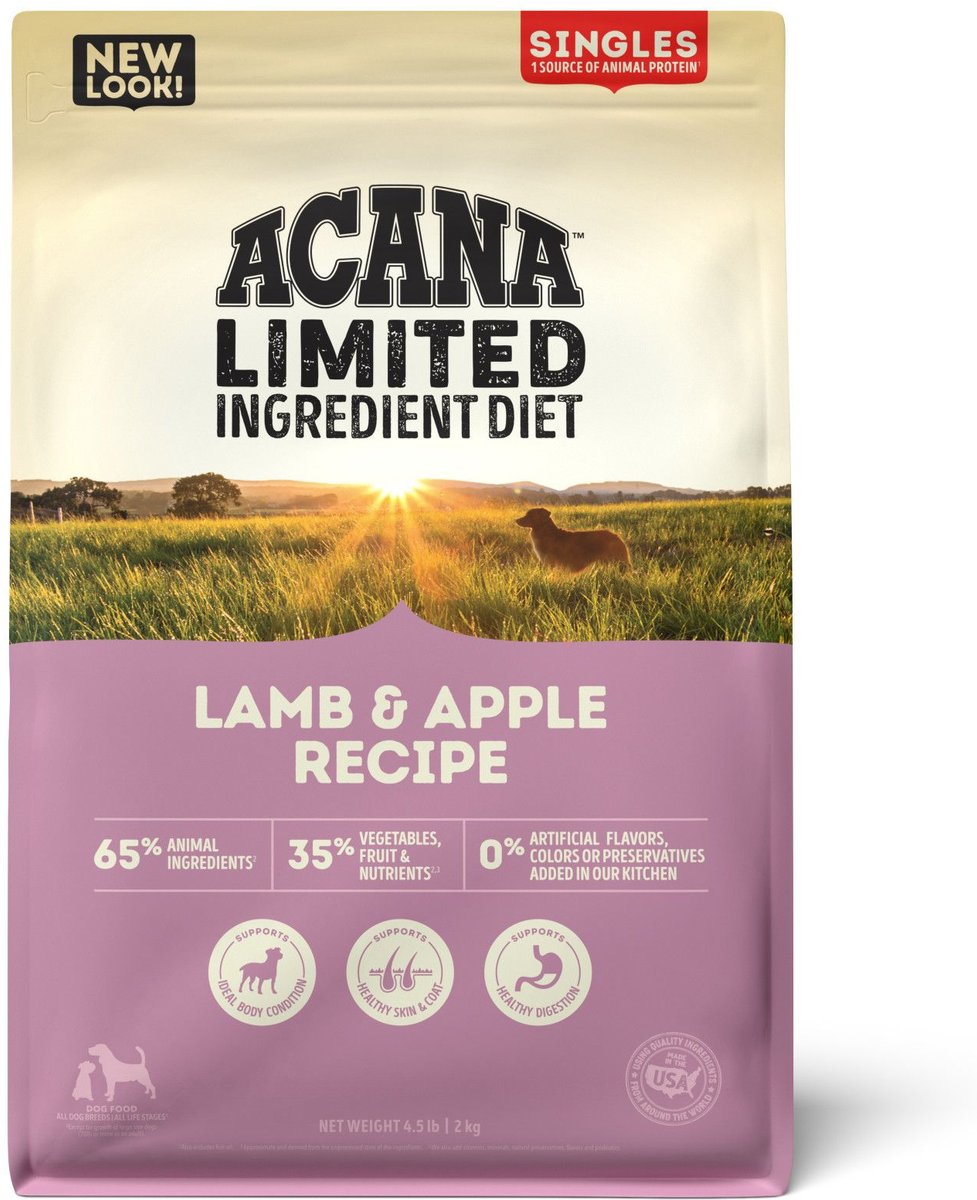
Champion Pet Food, based in Alberta, owns Acana Dog Foods. Founded in 1985, they offer the ACANA Singles Limited Ingredient Diet Lamb & Apple Recipe Grain-Free Dry Dog Food, ideal for dogs with atopic dermatitis.
It features high-quality lamb and minimal ingredients, excluding by-products, fillers, grain, corn, soy, wheat gluten, and artificial additives.
Recommended for diagnosing and treating food allergies.
- First 5 Ingredients: Deboned Lamb, Lamb Meal, Lamb Liver, Sweet Potato, Whole Chickpeas
- Guaranteed Analysis: Crude Protein 31% min, Crude Fat 17% min, Crude Fiber 5% Max
- Calories: 371 kcal per 8-oz cup
- Suitable for which dogs: All breeds from small Border Terriers to Giants like Greater Swiss Mountain Dogs and large breeds like Weimaraners.
- Feeding: one 8-oz cup of food for every 25 pounds of its body weight.
- Key Benefits: It contains above-average protein. Above-average fat. And below-average carbs when compared to other dry dog foods.
- Price: $89.99 per 25-lb bag ($3.60-lb)
Canidae PURE Grain Free, Limited Ingredient Dry Dog Food Salmon and Sweet Potato
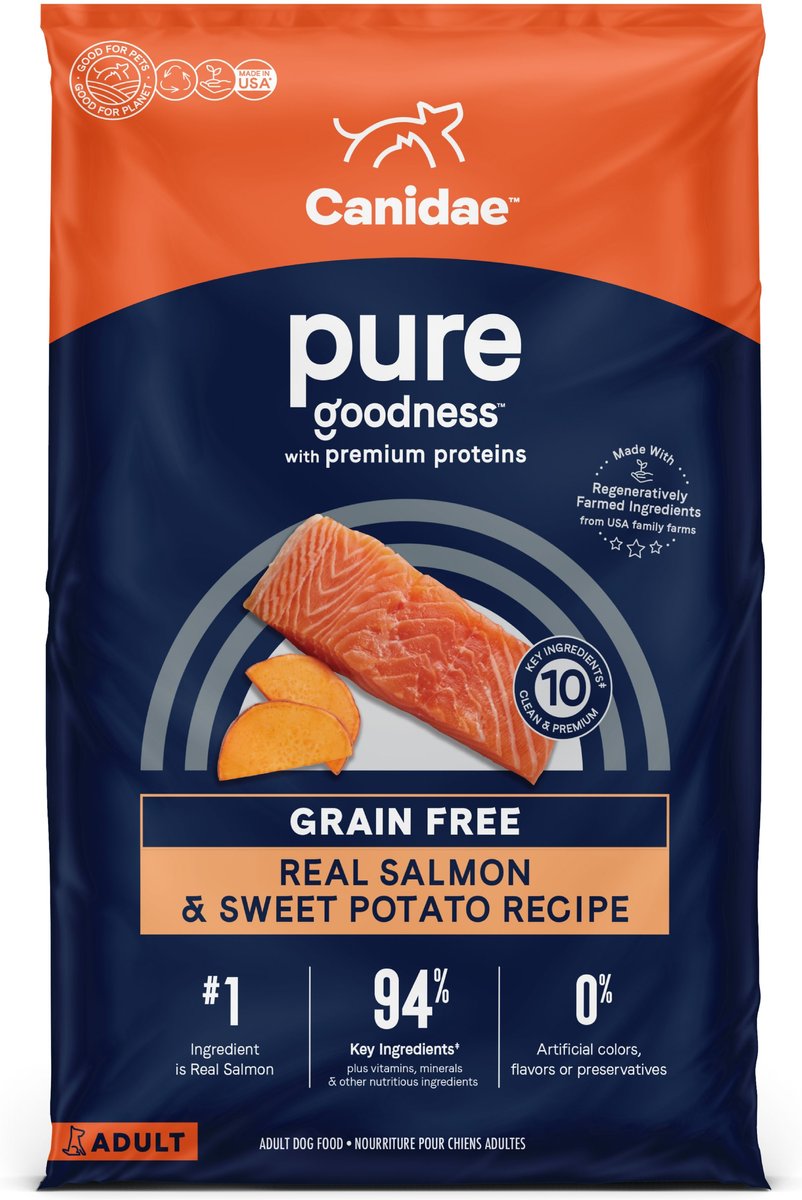
CANIDAE Grain-Free PURE Limited Ingredient Salmon & Sweet Potato Recipe Dry Dog Food is ideal for dogs with sensitivities, featuring just eight wholesome ingredients.
With salmon and salmon meal as the primary protein sources, it supports breeds like English Bulldogs, Boxers, and Pugs.
Highly recommended as the best Grain-Free dry dog food.
- First 5 Ingredients: Salmon, Salmon Meal, Menhaden Fish Meal, Lentils, Sweet Potatoes
- Guaranteed Analysis: Crude Protein 32% min, Crude Fat 14% min, Crude Fiber 4.5% Max
- Calories: 459 kcal per 8-oz cup
- Suitable for which dogs: All active breeds, from your Weimaraner to the little Scottish Terrier and the massive Neapolitan Mastiff.
- Feeding: one 8-oz cup of food for every 25 pounds of its body weight.
- Key Benefit: Limited protein-only salmon can go a long way to keep your sensitive dog healthy.
- Price: $74.99 per 24-lb bag ($3.12-lb)
Rachael Ray Nutrish Just 6 Limited Ingredient Diet Dry Dog Food
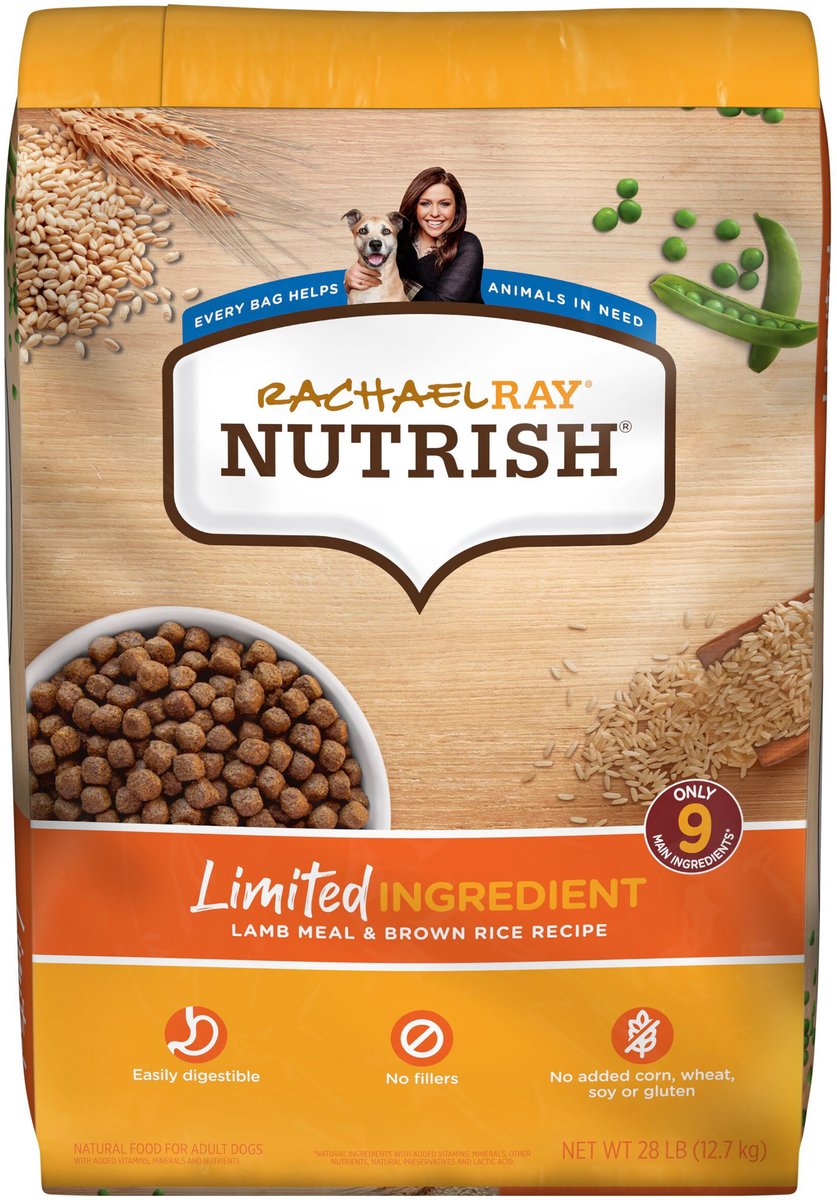
Rachael Ray Nutrish Just 6, acquired by J.M. Smucker in 2018, offers high-quality, limited-ingredient dog food.
Featuring lamb meal, it’s free from corn, wheat, soy, gluten, and artificial additives.
Ideal for dogs with food sensitivities, it’s a nutritious, affordable option, recommended for Wirehair Fox Terriers, Pointers, and Boxers.
- First 5 Ingredients: Lamb Meal, Brown Rice, Brewers Rice, Dried Beet Pulp, Chicken Fat (preserved With Mixed Tocopherols)
- Guaranteed Analysis: Crude Protein 20% min, Crude Fat 13% min, Crude Fiber 4% max.
- Calories: 355 kcal per 8-oz cup
- Suitable for which dogs: Large breeds like Weimaraners, Samoyed Huskies, and Airedale Terriers.
- Feeding: one 8-oz cup of food for every 25 pounds of its body weight
- Key benefits: No corn, no wheat, no soy, Limited Ingredient Diet, gluten-free, pea-free, but plus added vitamins, minerals, taurine, and other nutrients.
- Price: $39.98 per 28-lb bag ($1.43-lb)
Wellness Simple Limited Ingredient Duck & Oatmeal Recipe Dry Dog Food
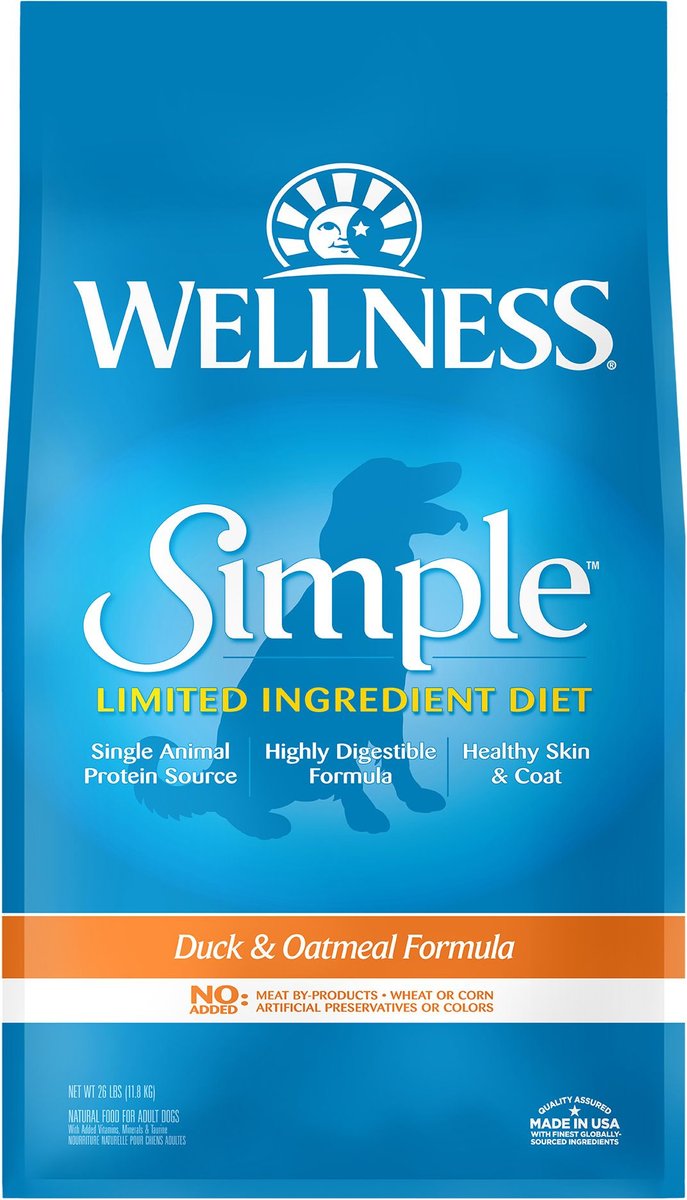
Wellness Simple Duck and Oatmeal Recipe by Wellpet LLC, founded in 1926, offers a single protein source for dogs with allergies.
It’s gluten-free and grain-free, ideal for sensitive stomachs.
With above-average protein and notable meat content, it’s recommended for Welsh and Boston Terriers prone to skin conditions.
- First 5 Ingredients: Duck, Oatmeal, Peas, Ground Rice, Potato Protein
- Guaranteed Analysis: Crude Protein 21% min, Crude Fat 11% min, Crude Fiber 4.75% Max
- Calories: 450 kcal per 8-oz cup
- Suitable for which dogs: Dog breeds of all sizes predisposed to skin allergies like Dalmatians and Weimaraners
- Feeding: one 8-oz cup of food for every 25 pounds of its body weight.
- Key Benefit: Includes a single source of protein that is expertly balanced with easily digestible carbohydrates
- Price: $79.98 per 26-lb Bag ($3.07-lb)
Blue Buffalo Wilderness High Protein Grain Free, Natural Puppy Dry Dog Food, Chicken
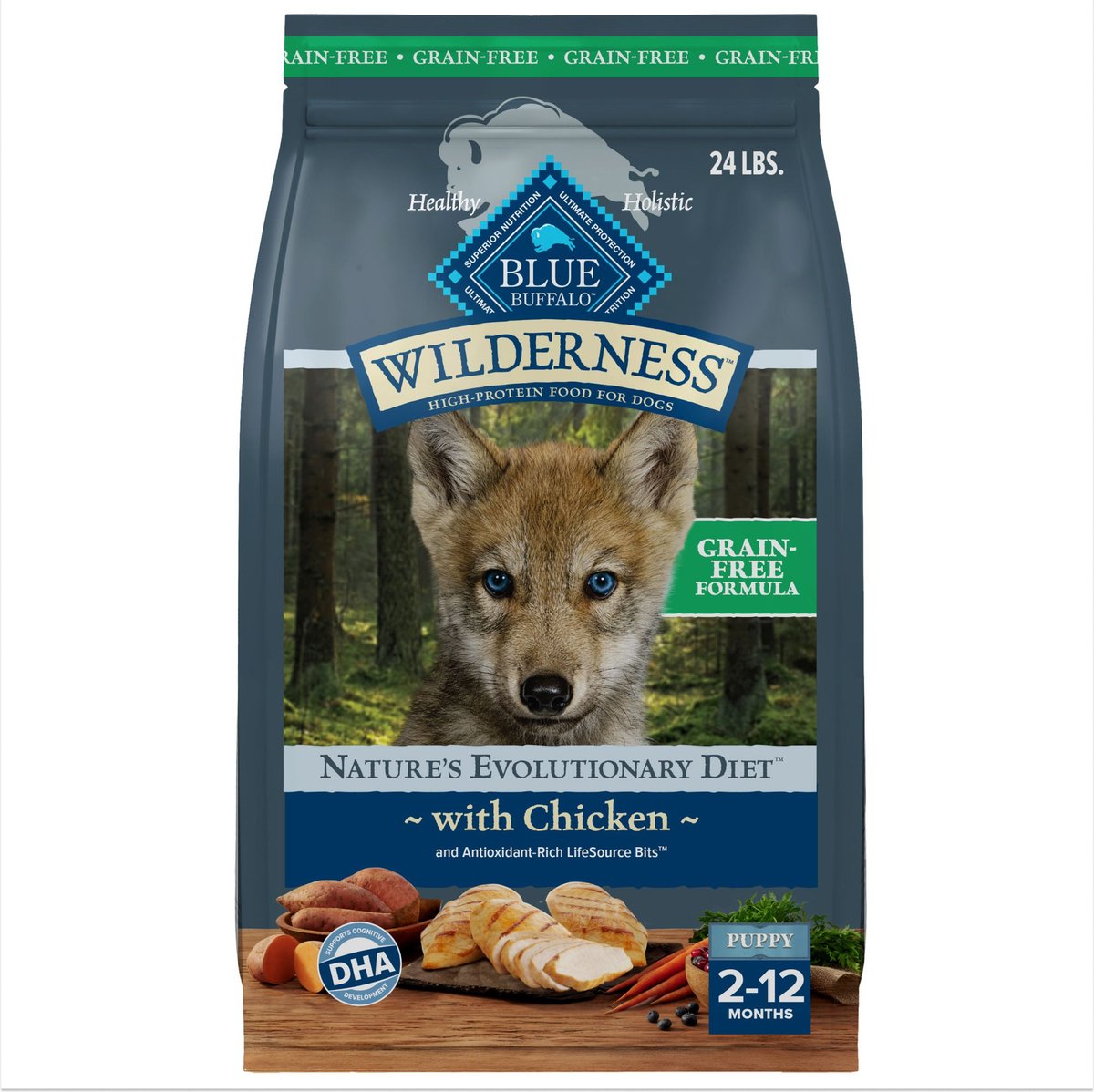
Blue Buffalo Wilderness Puppy Chicken Recipe, launched in 2003 by Bill Bishop and his sons, now under General Mills, is low-priced with average quality.
It offers real chicken for muscle growth, and taurine for brain and eye health, and is free from grains, corn, wheat, soy, and meat by-products.
A balanced choice for puppies.
- First 5 Ingredients: Deboned Chicken, Chicken Meal, Pea Protein, Peas, Tapioca Starch, Pea Starch
- Guaranteed Analysis: Crude Protein 36% min, Crude Fat 16% min, Crude Fiber 5% max.
- Calories: 423 kcal per 8-oz cup
- Suitable for which dogs: All breed puppies with food sensitivities.
- Feeding: one 8-oz cup of food for every 25 pounds of its body weight
- Key Benefit: This nutritious meal also contains fatty acids like the ones found in mama’s milk along with a carefully formulated blend of vitamins, antioxidants, and minerals to support his overall growth and development.
- Price: $59.98 per 24-lb bag ($2.50-lb)
What Should You Look for in Dog Foods for Atopic Dermatitis?
Dogs may develop abnormal reactions to food, such as atopic dermatitis or itchy skin, often called “allergy” or “hypersensitivity.”
These immune system reactions require prior exposure to the allergen. In contrast, food “intolerance” doesn’t involve the immune system and can occur on first exposure.
Both conditions cause similar symptoms, making it difficult to distinguish between them without veterinary help.
Unlike humans, who may experience throat swelling from allergies (e.g., shellfish), dogs typically show skin symptoms, especially itching, as their primary allergic reaction.
Proper diagnosis and guidance are essential for treatment.
What Causes Allergic Reactions in Dogs?
Dogs with food allergies typically react to proteins in their diet, such as those from beef, dairy, wheat, or chicken.
The immune system mistakenly identifies these proteins as threats. Food allergies take time to develop, so symptoms may appear after prolonged exposure to the offending ingredients.
What Are the Symptoms of Food Allergies or Dermatitis?
Common symptoms of food allergies in dogs include non-seasonal itching, especially on the ears and feet, as well as chronic ear and skin infections.
Some dogs may also experience vomiting, diarrhea, or excessive gas. Symptoms often appear in dogs under one year old but can develop at any age.
Foods to Avoid for Dogs with Atopic Dermatitis?
To identify the cause of food allergies, an elimination process with a limited-ingredient diet is recommended.
Once the trigger is found, it should be removed from the dog’s diet. Common allergens include proteins from veal, chicken, dairy, eggs, and wheat, not the entire food product itself.
Are Grain-Free Diets Good for Dogs With Atopic Dermatitis?
Only dogs with diagnosed grain allergies should avoid grains. Breeds prone to Atopic Dermatitis, like Golden Retrievers and German Shepherds, may react to animal proteins like chicken rather than grains.
Most grains benefit dogs, with only a few causing allergic reactions.
Healthy grains for dogs:
- Whole wheat: Rich in fiber from the wheat bran, which acts as a prebiotic, supporting gut health.
- Brown rice: Provides fiber, carbohydrates, B vitamins, magnesium, selenium, phosphorus, and vitamin E, aiding energy metabolism.
- Barley: High in energy and B vitamins, barley groats are a great fiber source for dogs.
- Oats: With a low glycemic index and soluble fiber, oats help manage blood sugar and cholesterol. They are also high in protein and low in gluten, ideal for dogs with grain sensitivities.
- Millet: A gluten-free grain high in antioxidants, supporting the immune system in gluten-sensitive dogs.
- Quinoa: A nutrient-dense, calcium-rich alternative to corn and wheat, quinoa supports bone health with minimal risk of intestinal irritation.
- Sorghum: Low in glycemic index, sorghum is beneficial for diabetic dogs and provides minerals like phosphorus, magnesium, and zinc.
- Rye: Similar to barley, rye supports weight control, heart health, and blood sugar regulation but should be avoided by dogs with gluten sensitivities.
- Corn: While some dogs are allergic, corn provides digestible carbohydrates, vitamin E, beta-carotene, and essential fatty acids for coat health in others.
Low-Quality Grains to Avoid:
Grain by-products are secondary ingredients from grain processing, often added to dog food for affordability, not nutrition.
While considered safe, they lack the nutritional benefits of whole grains and may be unsuitable for dogs with allergies.
- Wheat Gluten: A highly processed wheat product used as a cheap protein source. Animal proteins are more bioavailable to dogs, and gluten can cause issues in allergy-prone pups.
- Corn Gluten Meal: A by-product of processed corn products like corn syrup. Though protein-rich, it has poor digestibility for dogs.
- Wheat Middlings: Leftovers from wheat milling, often called “floor sweepings.” It offers minimal nutritional value beyond being a carbohydrate source.
- Cereal Fines: Fine particles from grain processing, often from unknown sources, making them nutritionally uncertain and problematic for dogs with allergies.
- Grain Hulls: By-products like rice and oat hulls are used for fiber but lack the nutritional benefits of whole grains.
Choosing formulas with whole grains over by-products ensures better nutrition and avoids filler ingredients.

